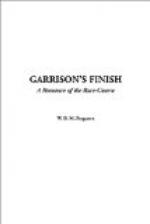“And what is a cad?” he asked abstractedly.
“One who shames his birth and position by his breeding.”
“And no question of dishonesty enters into it?” He could not say why he asked. “It is not, then, a matter of moral ethics, but of mere—well——”
“Sensitiveness,” she finished dryly. “I really think I prefer rank dishonesty, if it is offset by courtesy and good breeding. You see, I am not at all moral.”
Here Mrs. Calvert made her appearance, with a book and sunshade. She was a woman whom a sunshade completed.
“I hope you two have not been quarreling,” she observed. “It is too nice a day for that. I was watching the slaughter of the innocents on the tennis-court. Really, you play a wretched game, William.”
“So I have been informed,” replied Garrison. “It is quite a relief to have so many people agree with me for once.”
“In this instance you can believe them,” commented the girl. She turned to Mrs. Calvert. “Whose ravings are you going to listen to now?” she asked, taking the book Mrs. Calvert carried.
“A matter of duty,” laughed the older woman. “No; it’s not a novel. It came this morning. The major wishes me to assimilate it and impart to him its nutritive elements—if it contains any. He is so miserably busy—doing nothing, as usual. But it is a labor of love. If we women are denied children, we must interest ourselves in other things.”
“Oh!” exclaimed the girl, with interest; “it’s the years record of the track!” She was thumbing over the leaves. “I’d love to read it! May I when you’ve done? Thank you. Why, here’s Sysonby, Gold Heels, The Picket—dear old Picket! Kentucky’s pride! And here’s Sis. Remember Sis? The Carter Handicap—”
She broke off suddenly and turned to the silent Garrison. “Did you go much to the track up North?” She was looking straight at him.
“I—I—that is—why, yes, of course,” he murmured vaguely. “May I see it?”
He took the book from her unwilling hand. A full-page photograph of Sis was confronting him. He studied it long and carefully, passing a troubled hand nervously over his forehead.
“I—I think I’ve seen her,” he said, at length, looking up vacantly. “Somehow, she seems familiar.”
Again he fell to studying the graceful lines of the thoroughbred, oblivious of his audience.
“She is a Southern horse,” commented Mrs. Calvert. “Rather she was. Of course you-all heard of her poisoning? It never said whether she recovered. Do you know?”
Garrison glanced up quickly, and met Sue Desha’s unwavering stare.
“Why, I believe I did hear that she was poisoned, or something to that effect, now that you mention it.” His eyes were still vacant.
“You look as if you had seen a ghost,” laughed Sue, her eyes on the magnolia-tree.
He laughed somewhat nervously. “I—I’ve been thinking.”




